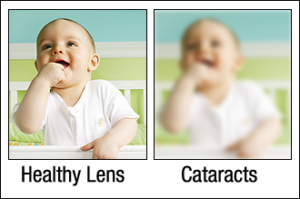Have you found out that you have cataracts? It may seem scary, but they don’t have to be something you’re nervous about.
Cataracts are one of the most common age-related eye conditions you can develop. You may think of cataracts as something that only affects the elderly, but you can start developing cataracts as early as your forties or fifties!
Since cataracts develop slowly, they can also be hard to notice at first. But as time goes by, they can make it harder to see and keep you from living your best life.
Although they will likely impact your vision, there’s no reason for cataracts to take over your life. See an eye doctor regularly to catch the early signs and know the symptoms.
And when cataracts start to affect your quality of life, get the treatment you need to get your sight back. Keep reading to learn more about cataracts and when you should consider having cataract surgery!
What are Cataracts, and Why Do They Occur?

Cataracts occur when the eye’s natural lens, which is supposed to be clear, becomes cloudy. The natural lens becoming cloudy happens when proteins in the lens start to clump together, impacting the ability to see clearly.
Cataracts are almost always a by-product of the aging process. You can also develop them for other reasons, like diabetes, eye injuries, and corticosteroid use.
Most cataracts form very slowly over several years or even decades, making them more challenging to recognize. You may also mistake cataracts for presbyopia.
Presbyopia is the decreased ability to focus up close. Presbyopia develops when the natural lens loses flexibility, making it harder to see things up close. It’s also more common in adults over 40.
Many people with cataracts also have presbyopia, which may confuse their symptoms for similar eye conditions. If you’re unsure if you have cataracts, presbyopia, or both, this is one reason why it’s essential to see an eye doctor for regular eye exams.
Eye exams help your eye doctor diagnose and monitor the progression of your cataracts. It’s also helpful to know what cataract symptoms are.
What are the Symptoms of Having Cataracts?
If you have cataracts, you may experience common symptoms like:
- Blurry vision
- Light sensitivity
- Glare and halos
- Poor night vision
- Trouble seeing contrast
- Double vision in one eye

Again, these symptoms may develop very slowly, so they can be hard to recognize at first. But one of the most evident signs of cataracts is trouble seeing in low light, especially when driving at night.
You may find it difficult to read or complete other fine-focus tasks without using a direct source of light that’s right in front of you. When driving, you may find that not only do you have trouble seeing in the dark, but headlights from other cars create intense glare that’s hard to look at.
The combination of poor night vision, glare, and light sensitivity can even make driving at night dangerous. If you have trouble driving after dark, stop doing so and see your eye doctor as soon as possible. It’ll help keep you and other drivers safe until you can determine if you have cataracts and if it’s time to have them removed during cataract surgery.
When to Have Treatment By Choosing Cataract Surgery
It’s best to get your cataracts diagnosed early so your eye doctor can monitor their progression. But treatment and removing your cataracts are only recommended when your cataracts begin to affect your quality of life.
Since cataracts can take so long to develop, you may not need surgery right away. But once cataracts start to interfere with your daily life, it’s time for treatment.

For some people, this may mean that you start falling more often due to your impaired vision. For others, it may mean that you can no longer do the things you love, like hiking, sewing, knitting, or watching your favorite shows.
There’s only one way to treat cataracts, and that’s by having cataract surgery. It may be time to have cataract surgery if you struggle to do daily tasks because of poor vision.
If you can’t drive at night or have injured yourself due to poor vision, it’s almost certainly time for cataract surgery. If you’re unsure, talk to your eye doctor about cataract surgery and whether or not you need to have it.
But if cataracts are making your life harder, cataract surgery can fully restore your vision and give you your life back. What’s more, thanks to many premium IOLs, you may be able to achieve better eyesight than you had before cataracts!
Cataract Surgery and Recovery
Cataract surgery is one of the most commonly performed medical procedures you can undergo. It’s low-risk and highly effective.
Even if cataracts have rendered you completely blind, cataract surgery can restore your vision. The procedure removes your cataracts entirely by removing the lenses they’ve formed on.
When you get cataract surgery and have cataracts in both eyes, you’ll have one procedure for one eye and one for the other eye after the first finishes healing. These procedures are identical and only take about thirty minutes to complete.
Before cataract surgery begins, you’ll have your eye numbed using drops. You may also receive a mild sedative to relax if you’re nervous.
After numbing your eye, your surgeon will create a small incision. They’ll use a special instrument to break apart your natural lens and then remove the pieces through that incision.
Then an artificial lens called an intraocular lens, or IOL is inserted through the incision to replace the natural lens. After placing the new IOL, cataract surgery is complete! The incision doesn’t require any stitches and heals on its own.
Recovering After Cataract Surgery

Recovery from cataract surgery only takes a few weeks. During that time, you’ll be able to perform most activities as you usually would.
Take care to follow all instructions from your eye doctor regarding your recovery. You may need to avoid strenuous activities and stick to light exercising until being cleared.
While surgery can be daunting, cataract surgery has high satisfaction rates because it can save your vision. If you feel like cataracts are getting in the way of living your best life, take a stand and do something about it!
Schedule a cataract consultation at Omaha Eye & Laser Institute in Omaha, NE, today to learn more! Isn’t it time to see clearly again?


